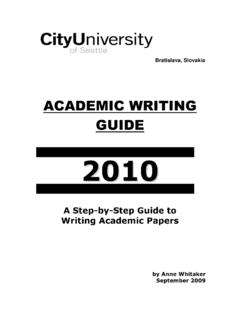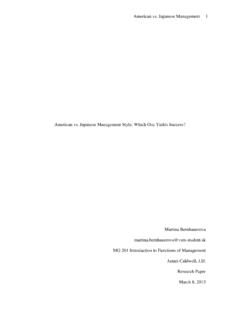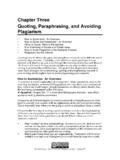Transcription of Research and APA Style Guide 2010 - VSM | CityU
1 Bratislava, Slovakia Research & APA Style Guide 22001100 Research Tips avoiding plagiarism How to Use Source Material in Papers, Presentations, and Online Posts APA Paper Format Guide Reference List Guide In-Text Citations Guide Example Paper in APA Style 1 What is this Guide ? This is a Guide for City University of Seattle students in Europe about doing, using, and citing Research in assignments. It is an update of the 2004 Research Paper Guide , which focused on writing Research papers. This Guide is all about Research and presenting Research , no matter the assignment. As a university student, you will use Research in academic papers, case studies, reports, marketing and business plans, presentations, and online discussion board postings.
2 This Guide should help you use Research in any of these assignments. Chapter 1 is about how to find the sources that you need; it has been updated to include more information about the free resources available online to City University of Seattle students. The goal of your assignments, however, is not just to do Research and present what you have learned. If your instructor and classmates wanted to see your Research , they could just read your sources themselves. The goal of your assignments is to present what you think about what you have learned. To do this, you need to use Research effectively to support your ideas, which is the focus of Chapter 2. It covers plagiarism as well as quoting, paraphrasing, summarizing, and sandwiching (integrating) source material in your work.
3 Finally, your coursework must be presented in a uniform and accepted Style , called APA, which is the subject of the remaining chapters. City University of Seattle has adopted APA Style as the standard Style for student work. This Style was designed by the American Psychological Association (APA) in 1929 to standardize the format and citation methods of all the articles for its journal. The use of too many individual styles was distracting and confusing for readers, so the APA demanded that all papers submitted to its journal follow one Style . Since then, APA Style has been updated many times to reflect changes in Research methods and technology. The latest updates occurred in 2007 and 2009, and those changes are included in this Guide . APA Style is accepted and used by professors, researchers, students, and writers in the social sciences.
4 As part of this academic community, you are expected to use it too. APA Style , however, was created for scholarly articles for journal publication, so this Guide has adapted and simplified it to fit the needs of a City University of Seattle student in Europe. (If you have to publish or present a paper professionally in APA Style , I recommend consulting the sixth edition of the Publication manual of the American Psychological Association for complete Style details.) Hopefully, this Guide will make doing, using, and citing Research a bit easier for you. If you still have questions, talk to your teachers, particularly your writing teachers, or send me an email. Good luck with your assignments. Anne Whitaker September, 2009 2 Table of Contents What is this Guide ?
5 1 Table of Contents .. 2 I. Research Guide .. 3 Planning Research .. 3 Using City University of Seattle s Online Library .. 5 Using City University of Seattle s Online Databases .. 6 Searching on the Web .. 9 Evaluating Web Sources .. 10 II. Using Research Effectively .. 13 plagiarism Basics .. 13 Citing the Source .. 15 Naming the Author/Speaker .. 16 When to Quote, Paraphrase, or Summarize .. 17 Quoting .. 17 Paraphrasing .. 19 Summarizing .. 21 Sandwiching Source Material .. 23 avoiding plagiarism .. 26 III. APA Paper Format Guide .. 27 Title .. 27 Header .. 28 Title Page .. 28 Abstract .. 28 Text .. 29 Headings .. 29 Reference List .. 30 Appendices .. 30 IV. Reference List Guide .. 31 List of Examples .. 32 Sources in Print .. 34 Sources Found on a CU (or Other) Online Database.
6 39 Print Sources Downloaded from the Web .. 42 Online Sources (Sources on the Web) .. 44 Other Sources .. 52 Frequently Asked Questions about Source Entries .. 54 Ordering Source Entries on the Reference 57 V. In-Text Citation Guide .. 58 Putting In-Text Citations in the Text .. 58 Forming In-Text Citations .. 58 Personal Communication .. 60 VI. Using Tables and Figures .. 61 VII. Example Paper in APA Style .. 63 VIII. APA Style Checklist .. 68 IX. Bibliography .. 70 3 I. Research Guide Whether you are writing a paper, analyzing a case, preparing a presentation, or posting your ideas in a discussion board, you will need to do Research . Going to Google, typing in a few words, and opening the first results is not sufficient Research for university-level work.
7 Doing good Research takes time. You will come to dead-ends and have to start over. You will change your mind and have to look for new evidence. You will come across more questions as you try to answer the ones you have. To save time, plan your Research and use the Research tools provided by the City University of Seattle online library. PLANNING Research Do not run straight to the Internet; read this section about planning your Research first. Preliminary (General) Research If you don t know exactly what you re looking for, still are not sure of a topic, and/or do not yet have an opinion about your topic, you will need to do some general Research to learn all that you can. Look through general sources (your textbook, encyclopedias, general news articles) to get basic background information, narrow your focus, discover the different opinions about the topic, and direct you to more specific sources.
8 Remember that very general sources like encyclopedias should not be used as sources in your work university-level academic work requires more in-depth Research . Using Wikipedia and other user-created Web sites Wikipedia is an online encyclopedia project, in which articles are written and edited by anyone who creates a Wikipedia account. First, as an encyclopedia, it should not be used as a source in university-level work. Secondly, because articles can be written by anyone and changed at any time without editing, you should not cite information found on Wikipedia to support your ideas this includes in online discussions. In its general disclaimer, Wikipedia itself writes, Wikipedia cannot guarantee the validity of the information found here.
9 The content of any given article may recently have been changed, vandalized or altered by someone whose opinion does not correspond with the state of knowledge in the relevant fields ( /wiki/Wikipedia:General_disclaimer) That doesn t mean Wikipedia is useless, however. It can help you Learn about a new subject Narrow down your topic Identify experts about your topic Develop a list of search terms for your topic Find good sources by exploring the references at the end of each article So, you can read it, but do not use it in your final coursework. Specific Research If you already know what you re looking for and feel fairly confident about your opinion on the topic, it s time for more specific Research . Use what you already know as well as what you have learned in your preliminary Research to plan this round.
10 Make a list of questions to answer Make a list of questions that you have about your topic which Research can help you 4 answer. Decide which ones are the most important and start your Research there. Make a list of what you re looking for What do you need to support your ideas? What kind of evidence facts, examples, statistics, studies, first-hand accounts, expert opinions? What kind of information does the assignment require? Make a list of search words Make a list of keywords related to the questions and needs listed above. Do not limit yourself to one or two words! The more words you try, and the more combinations you use, the more success you ll have. Determine where to search Which sources of information will give you what you need? Start in the most likely place.



